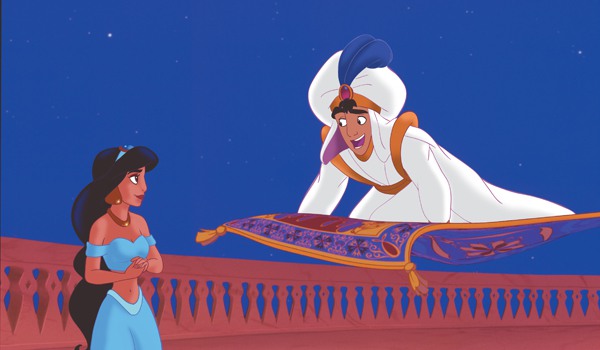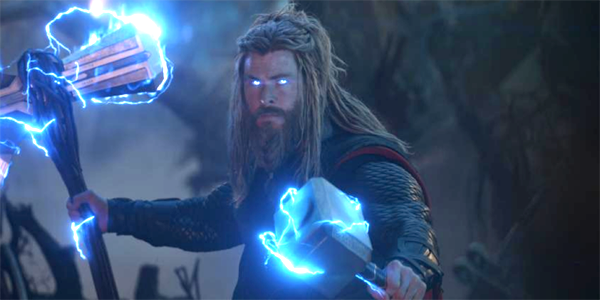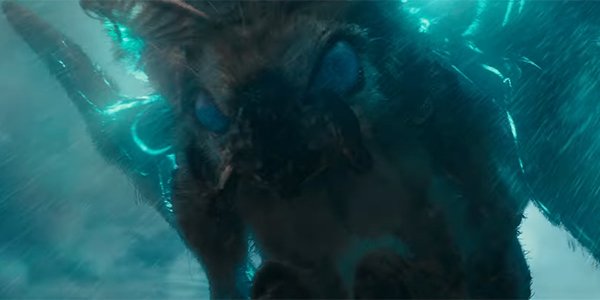
Before it was announced, it seemed inevitable that Walt Disney Pictures would add its Aladdin movie to its dossier of live-action updates. On May 24th, audiences will bear witness to Guy Ritchie’s new vision of the magical rags-to-riches story featuring a big, blue Will Smith assuming the iconic role of Genie.
The beloved, 1992 original animated hit is regarded by many fans as untouchable, especially due to its Academy Award-winning music by Alan Menken and Robin Williams’ incomparable performance as the voice of Genie.
While fans are entitled to their opinions regarding a remake to such a lightning-in-a-bottle movie, the classic still clearly holds up. But how well do you really know know the original Aladdin movie?
Let’s revisit the kingdom of Agrabah and take a deeper look behind the bright-colored veil to uncover a few facts about Aladdin that you may not have known before.
Robin Williams Recorded Enough Material As Genie For More Movies
The Genie in Aladdin is considered by many as the greatest of Disney’s classic animated characters. Much of the credit goes to future Academy Award-winner Robin Williams, whom the filmmakers allowed to go hog wild with the role, given that they had already written the character with him in mind.
Williams went much deeper into the role than the rest of the Aladdin cast, and so much that his time spent in the recording studio ended up resulting in almost 16 hours of potentially usable material, although a clause in his will says Disney can't use it until 25 years after his death. Aladdin is a mere 90 minutes. Imagine trying to cut down a gold mine to just one brick!
Additionally, Robin Williams’ improvisational performance style when voicing Genie actually proved somewhat problematic to the film’s Oscar potential. So much of his dialogue was ad-libbed that it cost Aladdin an Academy Award nomination for Best Adapted Screenplay.
Thankfully, Alan Menken’s original score and song “A Whole New World” saved the Aladdin movie from leaving awards season empty-handed.
The Real Deal With The Street Peddler Who Introduces Aladdin
Aladdin begins with the now-controversial song “Arabian Nights” (more on that later) sung by a character known as The Peddler. The Peddler struggles to sell his merchandise to the audience, until he presents a lamp that he claims is nothing ordinary.
He uses the lamp as a segue into the main story of the Aladdin movie. Then, for the rest of the film, he is never seen or mentioned again. So, what was his point to the story anyway, other than providing an introduction?
Considering the Peddler was voiced by Robin Williams, fans have speculated the character is actually a post-freedom Genie in disguise. In a 2015 interview to promote the Aladdin Blu-ray release, co-director Ron Clements revealed the truth behind the fan theory stating:
That's true! That was the whole intention, originally. We even had that at the end of the movie, where he would reveal himself to be the Genie, and of course Robin did the voice of The Peddler. Just through story changes and some editing, we lost the reveal at the end. So, that's an urban legend that actually is true.
Huzzah! A Disney animated movie fan theory finally confirmed! Now, I’ll just wait patiently for someone to admit that Aladdin really does tell Jasmine’s tiger to take its clothes off.
Jafar Almost Sounded Like A Certain Star Trek Character
Aladdin’s ruthless, power-hungry villain (and one of the best Disney movie villains ever) Jafar was voiced by Jonathan Freeman.
Jonathan Freeman is one of the few members of the Aladdin cast to reprise his original role in multiple spin-off projects, including a Broadway rendition of the film. His unforgettable portrayal has remained one of the most endurable aspects of the film. But can you imagine Jafar in the voice of, say, Star Trek: The Next Generation’s Captain Jean-Luc Picard?
One of Disney’s first choices for the voice of Jafar was world-renowned actor Patrick Stewart. Unfortunately, due to scheduling conflicts with his role on Star Trek, he was forced to turn the role down. Following the Aladdin movie’s $504 million international success story, Stewart has gone onto state in interviews that turning down Jafar is one of the greatest regrets of his career.
I imagine he would have been dynamite for that Broadway show, too.
Princess Jasmine Was Almost Completely Different
Jasmine, the royal romantic interest of Aladdin’s title character played by Linda Larkin, is arguably one of the better female role models among Disney’s animated character creations. However, her character's original concept is nothing like what Aladdin movie fans remember, for better or for worse.
For one, Jasmine was initially meant to have a more active role in the story.
Instead of breaking down and crying over her forced engagement to Jafar, she was supposed to angrily confront her father: a sequence that got nixed to save time on animation designs. Instead of needing Aladdin to rescue her from Jafar’s giant hourglass, she was originally going to free herself using a jewel in her headpiece.
I would call these missed opportunities, but they are ultimately forgiven by Disney’s decision to not go with Jasmine’s original personality design.
Instead of the bored, kindhearted princess longing for a more normal life, Jasmine was going to be a total brat who only wanted to marry the richest prince available. A song was written, intended to be her defining theme, called “Call Me a Princess.” Only when she falls in love with Aladdin would she learn humility and change into a sweeter version of herself.
Disney, believing audiences would not like that interpretation of her, decided to change Jasmine into the humble character she is admired as today. Good thing the creative team was able to make the change before Aladdin’s theatrical movie release, unlike a different mistake.
One Aladdin Song Sparked Controversy
The opening song of Aladdin is "Arabian Nights," sang by Bruce Adler, who served as The Peddler’s singing voice. The song is meant to set the tone of the story and inform the audience of its setting.
Among Alan Menken’s many memorable, award-winning songs in Aladdin, “Arabian Nights” is not one that has gotten much love. Those who saw the film in its initial theatrical run may understand why.
There is a lyric right before the line, “It’s barbaric, but hey, it’s home,” that says, “Where it’s flat and immense and the heat is intense.” Those are not the original words, however. The original lyric said, “Where they cut off your ear if they don't like your face.”
This sparked major controversy from Arab-American groups who claimed the mention of cutting off ears was racist. Disney and Alan Menken agreed to change the lines for Aladdin’s home video release.
What do you think of our Aladdin facts? Do they make "a whole new world" of difference? Catch the live action version of the movie when it hits theaters this weekend, and be sure to check out more of what's coming this summer with our full schedule.





